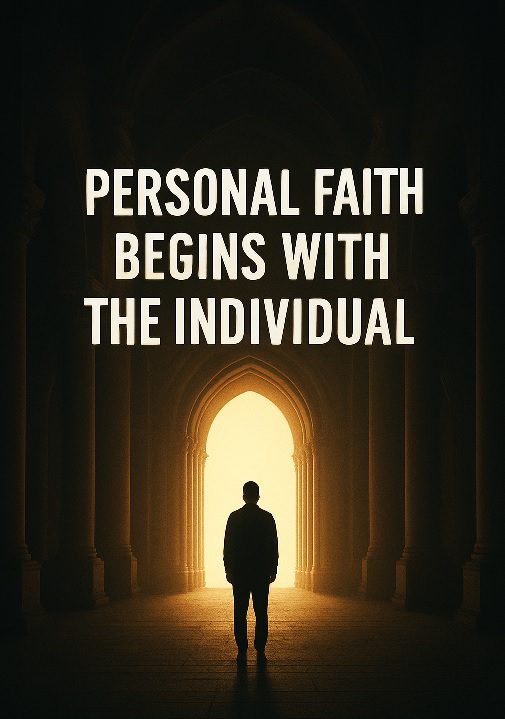Personal Faith: Making Religion Truly Transformational
Man is a deeply religious creature. From the towering cathedrals of Christianity to the grand mosques of Islam, from Hindu temples echoing with chants to Buddhist monasteries tucked in the mountains — it looks like God must be clapping His hands in delight. Perfect! Humanity has remembered its Maker.

People gather, sing hymns, fast, tithe, meditate, and bow down. Big church, big temple, big mosque — surely God is smiling, right? But is this religion really personal and transformative, or are we just performing rituals?
The Cracks Beneath the Surface
Scratch the surface, and the shine fades. The very sects that claim to carry God’s torch — Sunni, Shia, Protestant, Catholic, Orthodox, Mormon, and more — have, at times, been at each other’s throats.
Wars have been fought, blood has been spilled, and temples have been burned, all in the name of the ‘same‘ God they claim to worship.
History is full of it:
- The Thirty Years’ War between Catholic and Protestant states in Europe-(OVer same God)
- The Crusades between Christians and Muslims (Same God according to Biblical Old Testament)
- More recent clashes between Sunni and Shia Muslims in Iraq and Syria (Same God)
Even today, extremists attack rival churches, mosques, and temples — not to prove truth but to silence what they dislike. Some lone ram, recently, even drives a truck into a Mormon church and sets it ablaze, dying in his own twisted movie. That’s not a win for God — it’s a loss.
Houses of Prayer: Open to All?
Any house of prayer — whether church, mosque, or temple — should, in theory, be open to anyone seeking a connection with God. After all, God is all-powerful, right? So powerful that we can’t even begin to imagine the fullness of that power. (I’ve written on this in detail in another post.) Yet somehow, we often shrink God down by insisting He cannot possibly be the same deity that someone else worships.
At the very least, if you’re a Christian, any Christian church should welcome you. If you’re a Muslim, any mosque should do. Simple enough. But is that really the case? Can a Shia comfortably walk into a Sunni mosque without feeling uneasy? Can an Anglican slip into a Catholic church nearby without feeling out of place?
Religion should unite us, yet too often it divides us — even within the same faith. As I explained in my Tower of Babel post, in our present state, it almost seems as if God prefers us divided. Better to quarrel among ourselves than unite against Him. And yet, paradoxically, in unity lies the very redemption we so desperately seek.
People of different faiths should be meeting, exchanging ideas, and sharing perspectives. After all, the only one who should truly be “offended” by the different faiths is the Creator, not a fellow human on Earth. But he doesn’t show it, however offensive we imagine it to be. If he can stomach it, don’t you think he will be pleased if we cooperate in a bid to find the true ‘religion‘. Think of two travelers walking the same road until it splits into different paths. Do they hurl insults at each other for taking different directions? No. They explain their choices, exchange contacts, and compare notes later. That’s what spiritual intelligence looks like.
Scientists do it all the time: they may disagree, but they share notes and respect each other’s work as they inch toward cures. Businesses do it: similar products compete, and eventually, the best one establishes itself. If this works in science and markets, why not in religion?
And when it comes to God, the stakes are even higher. He is so powerful that He can appear in any form He wishes. Which means we ought to be very careful before dismissing each other. The story of the Tower of Babel shows that the same God can still be at work through many languages and cultures — even when He confuses us.
Imagine If Jesus or Muhammad Came Today
Picture this: Jesus walks the streets today and wants to visit a church. Which one does He go to first? He knows full well that whichever church He enters will claim to be the true or right sect. Protestant, Catholic, Anglican, Mormon — each will think, “Ah, He is with us.” Haven’t we made it a bit tricky for Him?
The same scenario applies to Muhammad. He walks into a mosque — Sunni, Shia, Ahmadiyya — each sect may feel they hold the correct interpretation.
Now imagine you walk into a new Catholic church. They hand you the microphone to introduce yourself — as some churches do — and you say: “Hi, I’m so-and-so. I’m Muslim, and I’m here for work/holiday.” Suddenly, the room feels awkward. After all, both Muslims and Christians revere the Old Testament, but many still insist that the Muslim God is somehow different from the Christian God. (Correct me if I’m wrong — but that’s what many believe.)
The point? Religion was meant to connect people with God, not make it uncomfortable for the very prophets who came to guide us. Sectarianism has turned simple worship into a minefield of labels and borders, leaving even sincere seekers cautious or confused.
The Prosperity Gospel Effect
Then comes the modern wave: the prosperity gospel. Many believers treat faith as a shortcut to wealth and success, giving money to “touch the hem of Jesus’ robe” in hopes of blessings.
Teachers, knowingly or not, meet their congregations where they are. Some teach genuine lessons on success, but many of us suffer from the movie-theatre effect: the sermon excites us for a moment, then fades. Soon we’re doubting, hopping to another church, or coming back for a remake.
Strike The Balance, Please
Not every preacher is a wolf. Many, and i mean a big percentage, do a marvelous job, faithfully spiritually feeding the flock. But they also need to ask themselves: are we modern-day Pharisees?
If Jesus walked the streets today, would He rebuke the teachers first, or would He say, “Thanks, guys, I’ll take it from here”? That’s the challenge for every teacher: Would Jesus truly be proud of your work? Again many would confidently say yes — and rightly so. But others? They wouldn’t dare stand before Him.
Your Role in God’s Story
Religion has given us every chance to prove ourselves. The question is: will you, at the very least, be like the blind man Jesus healed, who became a living testimony and a benefit to God? Or will you waste away in hypocrisy, partial truths, and blind violence — a loss to Him?
As you walk in faith, make sure God doesn’t consider you a loss. Connect personally, not partially. Embrace your spiritual growth. Step into houses of prayer open to all, and let religion unify rather than divide. Jesus tried to unite all, while the pharisee tried to divide.
Call-to-Action for Social Sharing / Engagement:
Share this post if you believe spirituality should be personal, inclusive, and transformative. Join the conversation: can religion unite, or should it continue dividing us. Work has forced us to unite, while God has or has he?







